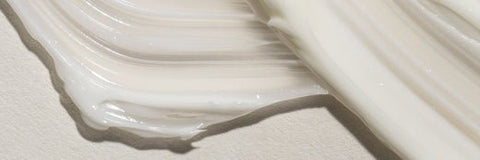Vitamin C is arguably the most important ingredient when it comes to getting gorgeous skin.
This natural ingredient is key for protecting your skin from environmental stressors, signs of aging, bad habits, and other unpleasantness we’re faced with on a daily basis. When added to your skin care routine, it can help you get glowing, radiant, youthful looking skin.
Read on to learn all about the many benefits of vitamin C, the different forms of vitamin C you’ll find in skin care, and how to integrate this key ingredient into your daily routine, or watch our video below.
IN A NUTSHELL
Ingredient Category: Antioxidant
Main Benefit: Vitamin C works to brighten your skin by evening skin tone and diminishing the look of dark spots, fine lines, and wrinkles.
Find It In: Nectar of the C Vitamin C Serum and Crème de la Cream Brightening Moisturizer.
Vitamin C Skin Care Benefits: 10 Ways It Can Help Your Skin
As an antioxidant, vitamin C helps fight environmental stressors that are a key reason why skin quality tends to degrade over time.
You probably know that you can consume antioxidants through eating fruits and veggies, but topical application is also incredibly important when it comes to keeping your skin in excellent shape.
Normal, healthy skin naturally contains high amounts of vitamin C, but this amount can diminish when exposed to environmental stressors and with age. We can help replenish healthy amounts of vitamin C to the skin by applying it topically.
Here are some of the vitamin C skin care benefits you can expect when using products with this key antioxidant:
- Plumps and smooths skin. – Vitamin C helps to plump and rejuvenate the skin, promoting a fresh-faced glow and a smoother looking texture.
- Fights signs of aging. – It helps to diminish the look of fine lines and wrinkles, and helps to keep you looking younger, more awake, and refreshed.
- Brightens skin. – The antioxidant effect of vitamin C skin care helps to reduce the appearance of discoloration and brighten your skin.
- Evens skin tone. – Vitamin C is known for its ability to even out your skin tone and improve overall quality and texture.
- Reduces appearance of dark spots. – Vitamin C also helps to reduce the appearance of dark spots that can develop over time.
- Protects against environmental stressors. – Known as “free radicals”, these stressors can tear down your skin on a cellular level; antioxidants combat free radicals that are in our environment and in our bodies.
- Improves texture. – Vitamin C also has exfoliant properties, which means it can improve the overall texture and appearance of your skin.
- Softens skin. – Reduce the appearance of dullness and give your skin a softer, more rejuvenated look with the help of vitamin C.

Different Forms of Vitamin C and What to Look For
When it comes to vitamin C as a skin care ingredient, knowing what to buy isn’t quite as simple as it sounds. Vitamin C comes in a variety of forms, and some are better for your outer layer than others. Knowing what to look for on a label makes choosing the right vitamin C skin care much easier! The technical terms for vitamin C in skincare can get confusing, so we’re here to decode the jargon.
Most common forms of vitamin C in skin care:
L-Ascorbic Acid (LAA) – Essentially, LAA is the pure form of vitamin C, and is the most common form of vitamin C skin care. It’s very potent and offers all of the benefits; however, because it is so strong, it is less stable and can often be too harsh for many people’s skin.
Sodium Ascorbyl Phosphate (SAP) – This water-soluble version is more stable than LAA. While LAA often comes with the risk of greater oxidation and irritation, Sodium Ascorbyl Phosphate offers all of the effectiveness without these risks. It’s a top choice for all skin types, and is highly unlikely to cause issues with even the most sensitive of skin. That’s why it’s our favorite here at Fleur & Bee.
Magnesium Ascorbyl Phosphate (MAP) – A water soluble derivative of vitamin C, MAP is less potent than LAA, more stable, and gentler. It helps to boost hydration, calm skin, and reduce oil.
Ascorbyl Palmitate – This fat-soluble version of vitamin C is a mixture of ascorbic acid and palmitic acid. It’s frequently used in oil-based skin care products and is also easier on your skin than pure LAA. It’s known to absorb easily and help to even skin tone and promote a youthful appearance.
Tetrahexyldecyl Ascorbate – A newer addition to many skin care products, this fat-soluble version of vitamin C is more stable, and easily absorbs into your skin. It’s known for helping with overall skin quality, but it can cause irritation in more sensitive skin.
Ascorbic Glucosamine – Another water-soluble version of vitamin C, Ascorbic Glucosamine is essentially vitamin C mixed with glucosamine, an amino sugar. This isn’t as widely used, so less is known about its effectiveness and benefits.

How to Integrate Vitamin C into Your Skin Care Routine
We know that vitamin C is crucial, but which skin care products should include this key ingredient? And what are the best ways to incorporate it into your skin care routine?
When it comes to topical skincare products, a vitamin C serum and a moisturizer are the two key products that can help you reap the vitamin C skin care benefits.
Vitamin C serum has the highest concentration of the ingredient and should come in a dark glass container to protect the ingredients from sunlight.
Vitamin C is a key ingredient in Fleur & Bee’s Nectar of the C Serum and Crème de la Cream hydrating face cream. Use the thinner product first (serum) and let it absorb before applying the thicker product (moisturizer).
Here’s a step by step guide for how to integrate topical vitamin C products into your routine:
1. Cleanse your face with a natural cleanser and rinse with lukewarm water.
2. Apply a natural toner and let it fully absorb into your skin.
3. Apply a few drops of the vitamin C serum to your face and neck. Wait 15 minutes for it to absorb.
4. Apply moisturizer to your face and neck.
5. Don’t forget sunscreen! It’s a must anytime you’re exposing your skin to UV rays.
Now that you know how to integrate a vitamin C serum and moisturizer into your routine, here are some pro tips that will make you a vitamin C serum expert!
Pro Tips:
- If you have more sensitive skin, stick with vitamin C skin care products that use sodium ascorbyl phosphate, as it’s one of the most gentle forms of the antioxidant. Be sure to do a patch test before using a new product on your entire face.
- Try to avoid combining vitamin C with retinol (vitamin A) at the same time. It can render the ingredients ineffective and also cause skin irritation. If you do use both a retinol treatment and a vitamin C serum, we recommend using one product in the morning and the other in the evening.
- Make sure that your vitamin C skin care products are free from toxins like parabens, sodium lauryl sulfate, phthalates, fragrance, and propylene glycol. They can reduce the effectiveness of vitamin C’s protective properties.
- Proper conditions are key for protecting the quality of vitamin C skin care products! When vitamin C is exposed to air and light, oxidation occurs — and that degrades the product and makes it less effective. It’s best to store vitamin C skin care products away from direct light, keep them airtight when not in use, and make sure they’re not exposed to extreme temperatures.
Frequently Asked Questions About Vitamin C Skin Benefits:
What are the benefits of vitamin C for skin?
From restoring skin’s natural glow to plumping and smoothing the skin to protecting against environmental stressors, vitamin C is a powerhouse skincare ingredient that also helps fight fine lines and wrinkles and reduces the appearance of dark spots.
What are the different types of vitamin C in skincare?
There are six main types of vitamin C found in skincare products:
- L-Ascorbic Acid (LAA) – A strong form of vitamin C that is considered vitamin C in its purest form.
- Sodium Ascorbyl Phosphate (SAP) – A water-soluble version of vitamin C that’s great for sensitive skin. We use it in Nectar of the C.
- Magnesium Ascorbyl Phosphate (MAP) – Also water soluble, it’s great for boosting hydration and reducing oil in the skin.
- Ascorbyl Palmitate – A fat-soluble version of vitamin C, it helps even out skin tone and restores a look of youth.
- Tetrahexyldecyl Ascorbate – Also a fat-soluble version of vitamin C, it’s great for improving skin quality but those with sensitive skin might want to steer clear of it, as it can cause irritation.
- Ascorbic Glucosamine – This water-soluble version of vitamin C, Ascorbic Glucosamine is essentially vitamin C combined with glucosamine.
Will vitamin C products turn my skin orange?
You might notice a slight orange tinge to your skin right after you apply a vitamin C serum or other product, but fear not, as it will disappear as the product absorbs into your skin. It is very important to keep your vitamin C products out of direct sunlight, so they don’t oxidize and lose their effectiveness.
What kinds of foods contain vitamin C?
We usually associate vitamin C with oranges and other citrus fruits, but it is also found in many other natural foods, such as potatoes, plums, cherries, broccoli, peppers, kale, and spinach.






